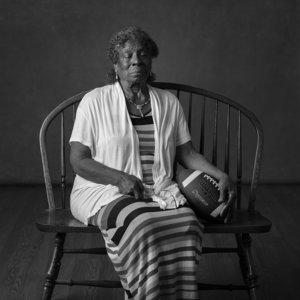Finding Hope in the 'Killing Fields' of Chicago

Betty Johnson
Michael Vanderaa
“On Dec. 12, 2013, Darnell Williams came home from work, changed clothes, and left again. A moment later, gunshots rang out. . . .”
“One week after his sixteenth birthday, Andre Taylor was walking his girlfriend to the bus stop. His family heard gunshots. . . .”
“As the family left Roseland Christian Reformed Church . . . a gunman walked up. . . .”
“In August 2010, Tanaja Stokes, 9, and Ariana Jones, 7, were outside jumping rope on the sidewalk. Two teens rode up on bicycles and opened fire at the girls. . . .”
All of these shootings are featured in a new portrait project called Moord Velden: Death and Redemption on the High Prairie of Chicago’s Roseland Neighborhood.
Moord Velden, which in Dutch means “killing fields,” features a series of disturbing stories and stark, black-and-white photographs that chronicle murders and shootings that took place in the Chicago neighborhood around Roseland Christian Ministries.
“Everyone who is in the project is part of Roseland,” said Roseland’s pastor Joe Huizenga, explaining that this Christian Reformed Church ministry has been working in this South Side section of the city for some 40 years.
“I’ve done the funerals, nearly every last one of them. These are people I knew. ”
In Moord Velden, writer Keri Wyatt Kent and photographer Michael Vanderaa portray the unpredictable and instantaneous ways in which bloodshed shatters lives. The project also offers reflections on the grief and triumph that can occur in the aftermath of violence, said Huizenga.
“We are showing stories of gun violence in Chicago, and want to put a face on our Christian Reformed brothers and sisters so you can know who they are,” said the pastor who initially connected with the photographer to begin the project.
“As difficult as these stories are, we find hope that comes through them. You see people pushing back to show alternatives to violence. We want to show how hope can grow in the midst of that.”
Shootings in Chicago, some related to gang violence and yet having many other causes as well, continue to rise. Summer weekends can be especially deadly. “During one week in August as we worked on this project, 110 people were shot, 24 of them killed,” says the introduction to Moord Velden.
In the exhibit, people connected to Roseland Christian Ministries speak about how over the years they have been caught in the crosshairs of violence that has erupted and spread like a malignant disease, cutting down loved ones, in a variety of circumstances in their neighborhood.
Betty Johnson recalls standing on her porch, looking at the yellow crime-scene tape cordoning off the area where her great-grandson Andre Taylor was shot and killed in March 2016.
“I remember just looking at him. I couldn’t do anything. He was just lying on the ground, with the rain falling . . .” she says.
Raphael Beecham talks about how his brother, Harold, was shot and killed nearly 20 years ago when he opened his door and was gunned down by a man who was chasing Harold’s girlfriend. The murder haunted him for years.
Raphael also shared that he spent time in prison for robbery. During that time, the deadliest prison riots in Illinois history broke out.
When he was released, Raphael, who is pictured in the exhibit sitting on a metal bench, knew he didn’t want to go back to prison. He returned to his neighborhood in Roseland and found some help through the soup line at the ministry center.
He was soon drawn into the church and became a deacon and then an elder who has worked to reach out to young people to steer them away from a life of violence.
“It’s just a blessing,” he says of the work he has been able to do through the ministry — work that has helped to heal the harsh memories. “God has continued to work with me, deal with me, to help somebody else out. But just because you’re helping someone doesn’t mean you’re above being helped yourself,” he added.
Visit moordvelden.com for more information and to arrange for a showing at your church, school, or museum.


